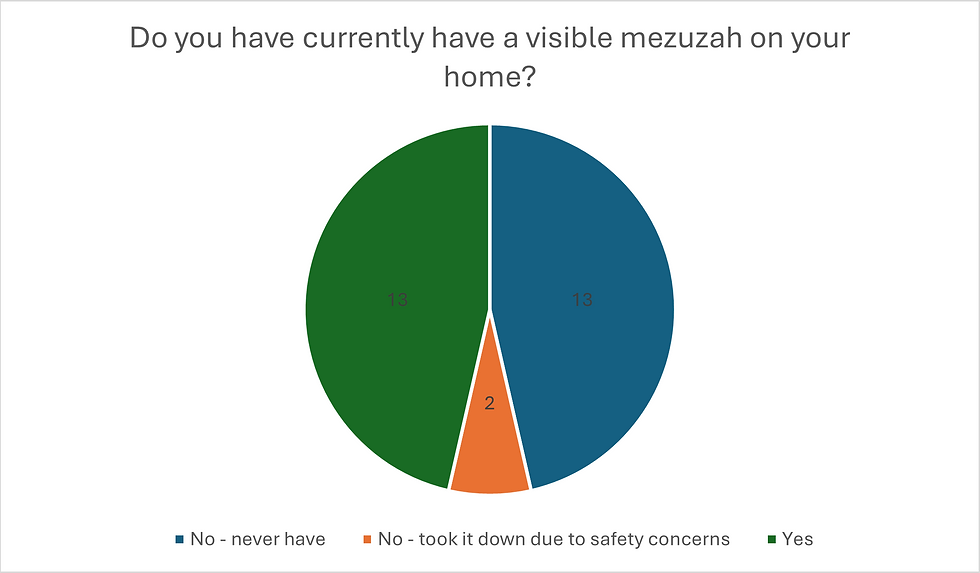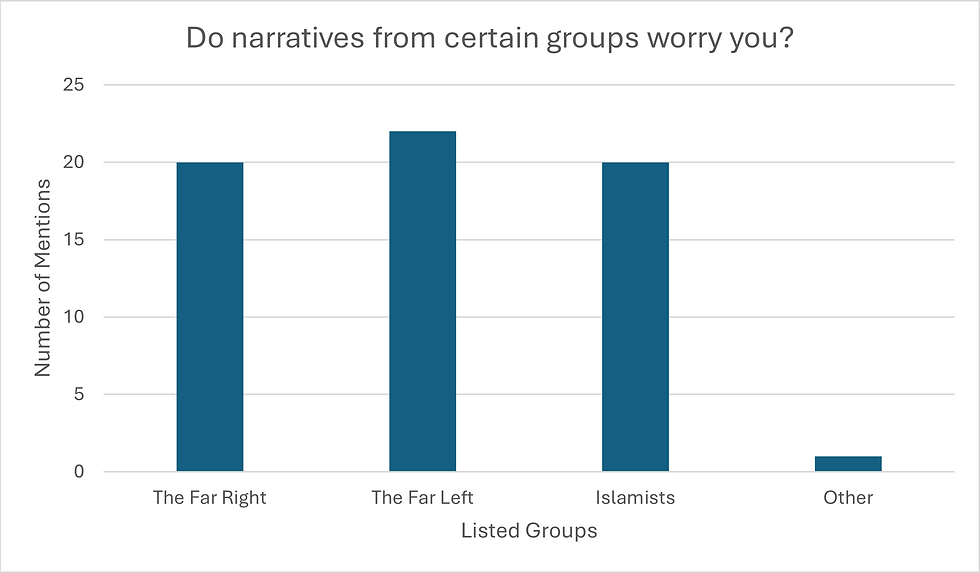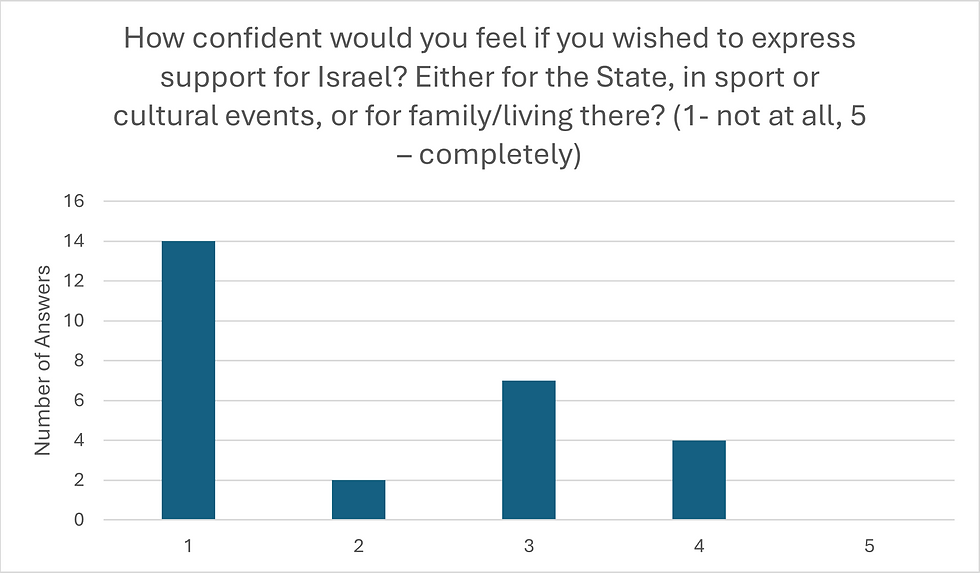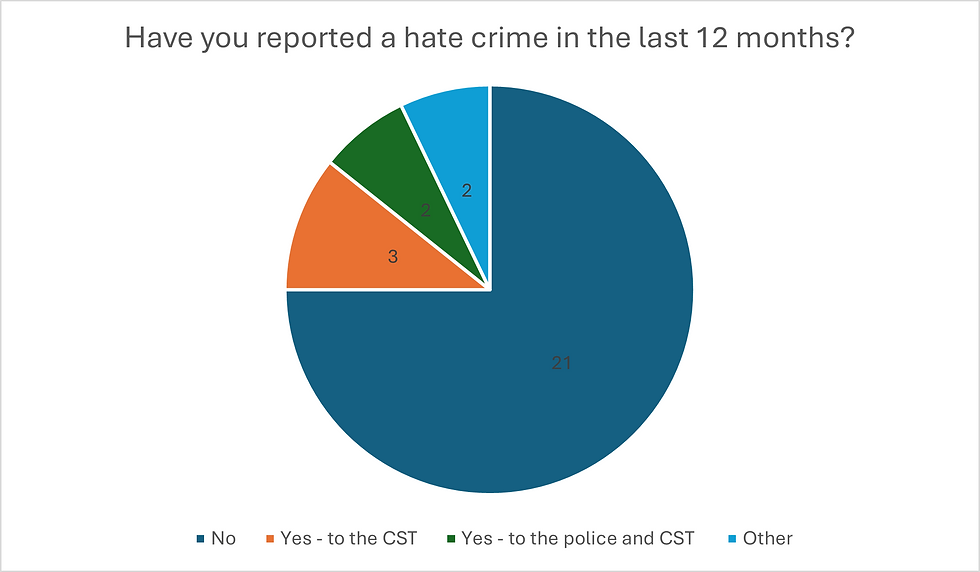July 2025 Consultation
- Derbyshire Jewish Community

- Jul 22, 2025
- 9 min read
This consultation was carried out by the Derbyshire Jewish Community to understand how local Jewish residents have been impacted by rising antisemitism and public discourse since the Hamas terror attacks on 7th October 2023. The survey aimed to gather honest, grassroots testimony about changes in behaviour, levels of fear, and attitudes toward public Jewish identity, with the intention of informing local MPs, councillors, and public bodies across Derby and Derbyshire. A grassroots survey capturing the voices of Derbyshire’s Jewish community following 7th October 2023, shared with local MPs and councillors to inform and encourage action.
“Jews cannot fight antisemitism alone. The victim cannot cure the crime. The hated cannot cure the hate. It would be the greatest mistake for Jews to believe that they can fight it alone. The only people who can successfully combat antisemitism are those active in the cultures that harbour it.”
Rabbi Lord Jonathan Sack z’l, Future Tense, Chapter 5, pp. 108-109
This survey was conducted in response to planned meeting with Baggy Shankar MP. We also received enquiries from local councillors, so an interim report was shared with him on 10th July 25.
Aims:
To gather data on the feelings of our members during a period of uncertainty since 7th Oct 2023 which can be circulated to local MPs and relevant local Councils.
Methodology
3 of our steering committee drafted questions. 1 member collated the questions and circulated to the group for approval. Please note that none of the steering group are professional social researchers.
2 of team based in Derbyshire, 1 in the city of Derby
The questions arose from common discussion themes in our community WhatsApp group.
It was decided that the survey should cover the whole of Derbyshire even though our meeting is with a Derby MP. Our Derbyshire members sometimes work, and/or visit the city. It is also hoped that this research can eventually be shared with Derbyshire County council, relevant boroughs, and Derbyshire MPs.
The survey was placed on our community website between Friday 4th and Friday 11th July 2025
A link to this page was circulated to 57 people via our July newsletter and advertised our WhatsApp group which has 52 members
The survey consists of 11 questions – 9 multiple choice and 2 long form answers
Results
· As of Friday 11th July, 28 surveys have been completed.
· This is a response rate of 49% (based on newsletter mailing list)
Quantitative Data
Do you currently have a visible Mezuzah on your home?
· A mezuzah is a small scroll with a passage of Torah which placed in a case and fixed to the right hand side of a door post.

Do you display a Hanukkah Menorah in a public window as per tradition?
· This candelabrum is traditionally displayed in a public window during the festival of Hanukkah (usually in December but dates vary).

If you are aware of a protest centring on events in the Middle East in you are, would you..

Other responses – 2 would watch to monitor the protest, 1 would join if they agreed with the messaging.
How confident or safe do you feel being outwardly Jewish in Derbyshire?

NB – 1 respondent did not give an answer
Do narratives from certain groups worry you?

One respondent noted concerns about narratives about Jews they found in Disability and LGBTQ+ groups.
Have your feelings and behaviours changed since 7th October 2023?

How confident would you feel if you wished to express support for Israel? Either for the State, in sport or cultural events, or for family/friends living there? (1- not at all, 5 – completely)

NB – 1 respondent did not give an answer
Have you reported a hate crime in the last 12 months?

Qualitative Data
The first long form answer question asked respondents whether their feelings had changed since 7th Oct 23. 78% of respondents indicated that their feelings had changed.
17 out of 28 (61%) indicated that they felt isolated from friends and the local non-Jewish community or unsupported. Examples include:
“I feel broken, frightened and vulnerable. I now hide my Jewish identity” – Derbyshire resident
“I am shocked at how little support the Jewish community has. I don’t feel anyone supports or protects us – not friends, community, not police or government” – Derbyshire resident
“I feel more separate and isolated than ever before…” – Derbyshire resident
“My brother-in-law (not Jewish) and his wife no longer speak to us, as they are literal Hamas supporters (verbally admitted to us in 2021)” – Derbyshire resident
17 out of 28 (61%) expressed a feeling of not being safe enough to display or state a Jewish identity. Examples include:
“More careful, but after Oct 7th my car was attacked on multiple occasions and threatened and verbal abuse” – Derby resident
“I feel vulnerable in public, I hide my Star of David from view. I no longer feel ‘part of the wider community’, I feel very much separate.” – Derbyshire resident
“Don’t talk about being Jewish at all. Worried about people’s reactions.” – Derby resident
“Have seen a marked increase in anti-Jewish hate in schools, and from some people on the left. E.g. I can no longer participate in anti-racist advocacy without passing some purity test” – Derby resident
This fear is particularly linked to the current conflict in Israel and Gaza, and rising anti-Jewish hate. It includes fear of verbal or physical attack as well as loss of friendships.
One participant stated that if they were younger they would emigrate.
Three out of 28 felt conflicted – seeing both sides to the conflict, with one lamenting a lack of nuance from both sides. For example:
“I feel if I mention Israel (where my brother and sister live and have spent time in air raid shelters and safe rooms); I always have to mention Gaza as though I don’t obviously know it’s horrendous for the Palestinians…”
Six out of 28 comments indicated an increased defiance or pride in being Jewish since 7th Oct, including a willingness to counter problematic narratives. For example:
“I stand up and speak out more on Jew hate and challenging misinformation over the whole issue in Israel” – Derbyshire resident
“Have become much more aware of how widespread antisemitism is and it has produced a sense of defiance in me – I will wear a Magen David frequently which is something I wouldn’t have done in the past.” – Derbyshire resident
Two comments referred to a feeling that Jews can be subjected to a ‘purity test’ when talking about Israel or in so-called anti-racist settings.
The second long form answer focused on how confident respondents felt expressing any support for Israel. This support can take diverse forms: for the existence of the State; for Israel at sporting or cultural events such as Eurovision; for family and friends living in Israel.
Five out of 28 (19%) respondents only felt comfortable discussing Israel with other Jews or in a perceived safe environment. For example:
“Only in my own home or personal community. Not in public because of the abuse likely to be received.” – Derbyshire resident
Sixteen out of 28 (57%) expressed a fear of the reaction they would receive, including fear of aggression. This included one Derbyshire respondent who now has non-Jewish family members who no longer speak to them. Another expressed a fear that their house would be egged if they had shown support for the Israeli Eurovision entry.
“Because of the hatred, I would be afraid I’d be targeted and frightened for my family’s safety.” – Derbyshire resident
Three expressed an unwillingness to be seen as supporting the current Israeli government.
“It’s assumed that being a Zionist is to uncritically support the Israeli government.” – Derbyshire resident
“Any support for Israel is taken as endorsement of Netanyahu’s regime.” – Derbyshire resident
Nine out of 28 (32%) directly expressed that they do not support the current Israeli government.
“I do not wish to support Israel’s current regime.” – Derbyshire resident
“Because of what its government has done and continues to do is indefensible. I do have family there, but I question why they moved there when they did not need to and feel very uncomfortable about it.” – Derby resident
“As an Israeli I do disagree with current policies pursued by the Israeli government but my love for the State and its people grows ever stronger.” – Derbyshire resident
Three expressed some ability at countering narratives but also acknowledged that they would receive negative responses.
One expressed frustration that they felt problematic narratives have been left to spread unchecked and that the authorities make no effort to address this. This mirrored another response indicating that neither the government nor the police do anything to protect Jewish communities.
Analysis of both data types
Theme 1: Fear and isolation
78% expressed a change of feelings or behaviours since 7th Oct 23. The majority of these changes were negative, with people saying they felt conflicted, isolated, or fearful. One person said they would emigrate if they were younger.
One respondent reported strife with non-Jewish family, while another expressed a fear of losing friendships if seen to be supporting Israel in any way.
Several respondents talked about removing Stars of David. This included one person who removed theirs when attending a hospital appointment.
There were more people choosing to no longer make a public display of a Hanukkah menorah (8 out of 28) than removing a mezuzah (2 out of 28) due to security concerns. It should be noted that a Hanukkah menorah is a more obvious symbol than a mezuzah. They are larger and meant for a public window. A mezuzah is fairly small and is easily mistaken for a doorbell. They are also much less obvious when a front door is set back from the road.
However, some expressed defiance in the face of perceived hostility.
26% felt closer to their Jewish identities and emboldened to speak out. This spirit is manifested in wearing Jewish symbols, speaking out about anti-Jewish hate, or monitoring pro-Palestinian protests for problematic narratives.
Theme 2: Concerns about current political narratives
Protests were a source of anxiety for the sample, with a majority (89%) of the group avoiding the area of a protest, or hiding Jewish identifiers while passing by.
Only one Derby respondent talked about the possibility of joining a protest “depending on the exact reason for the protest.”
Respondents have worries about a variety of political perspectives – from far right to far left, as well as Islamists. It should be noted that the highest level of anxiety (78%) was expressed about the Far Left, a group that often sees itself as pro-migration and anti-racist. Two noted an experience of feeling a need to state views on the conflict before being taken seriously (a "purity test"). This may also give context to the concern expressed about Disability and LGBTQ+ groups, which can have a more left-leaning feel to them.
One Derby respondent declared: “I have been disturbed by the lack of nuance from all sides.”
Theme 3: Difference between city and county when it comes to being openly Jewish
Anxiety appears to be higher in the city of Derby compared to the wider county of Derbyshire.
Such anxiety has led a small number of people to remove visible Jewish symbols such as a mezuzah or Hanukkah menorah from their homes.
The anxiety is not unfounded: 6 out of 23 respondents reported experiencing hate crimes, 5 within the last 12 months. One Derby respondent reported direct acts including vandalism of their car, threats, and verbal attacks.
It should be noted that not all hate crimes are reported. At least one respondent verbally shared that they had experienced a hate crime at work but had not reported it to any external body, relying on internal structures to resolve the incident. Three respondents reported to the CST (Community Security Trust – a Jewish organisation) only and not to the police.
Further exploration could be done to understand why people choose not to report.
Theme 4: Diverse views about the current Israeli government
There are diverse opinions on the topic of Israel/Palestine with 6 respondents stating that they do not support the current Israeli government. These positions were nuanced - one expressed a deep love of the state and its people which grows ‘ever stronger’ despite their criticism of the current government.
Conflicted feelings were expressed in a number of areas. Some were keen to express their empathy for Palestinian experience as well as Israeli experience.
Another theme was a fear that expressing any support for Israel would be seen as agreement with the current government. This could lead to potential threats that would create hostility or even physical threats.
A lack of nuance in discussion around Israel was noted with negative reactions expected, a feeling that people are unwilling to listen, and that authorities ‘aren’t doing enough to curb antisemitic voices’.
Conclusions
This sample suggests a significant level of anxiety amongst the area’s Jewish population. This has increased since 7th Oct 23, and has led to some altering behaviour and hiding their Jewish identity. This is connected with narratives surrounding event in the Middle East, and fear of a variety of sides of the debate is noted. This fear is related to reported hate crimes and possibly unreported crimes. In our digital culture it is likely that respondents are seeing narratives online that make them feel uneasy which they do not report.
Final thoughts
The study has highlighted some potential areas for further research such as reasons for people’s fears, if there is any difference in feeling between rural and urban Derbyshire residents, and what people would like local authorities to be doing. Please note that Derbyshire Jewish Community is a grassroots, volunteer led group so our resources are limited. We are not professionals in the field of social research and accept that this report will have limitations, however, it offers a unique insight into one of the UK’s smaller and more geographically spread communities.
Further reading
Commission on Antisemitism report - https://bod.org.uk/wp-content/uploads/2025/07/commissiononantisemitismreport-web.pdf
The Institute for Jewish Policy Research has a number of useful reports including:
They are currently collating this year’s survey results and we recommend looking out for the report’s publication in the autumn
The Community Security Trust (CST) regularly reports on antisemitism in Britain: https://cst.org.uk/research/cst-publications
.png)







Comments